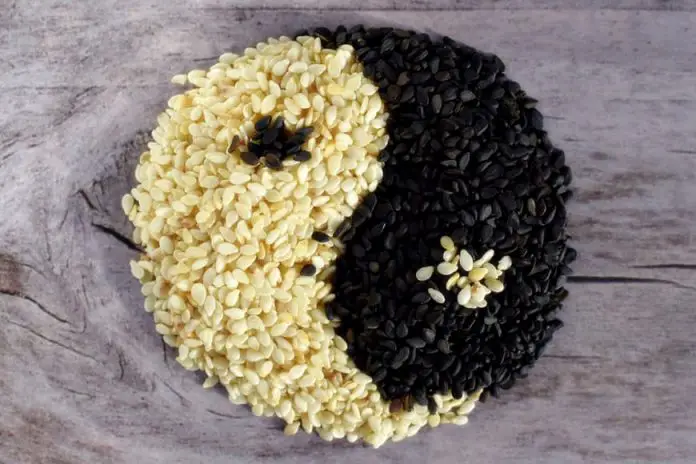Sesame seeds may be small but they offer big in terms of nutritional benefits. Nutritionists, including acclaimed wellness physician Dr. Josh Axe, recommend eating sesame seeds for heart health and lowering cholesterol.
These “superseeds” are good for you. But are they good for your dog, too? We’ll find out whether sesame seeds are among the seeds that you can share with your pooch.
Can My Dog Have Sesame Seeds?
You might find yourself asking this question if you are in the process of tweaking your dog’s diet. Many dog owners who follow the Biologically Approved Raw Food (BARF) Diet add seeds to their pet’s meal.
In case you haven’t heard of the BARF Diet, its aim is to limit a dog’s meat intake by introducing a wide variety of other foods available, including vegetables, fruits, bones, and seeds.
Does a dog benefit from the seeds the way humans do? The Animal Wellness Magazine included sesame seeds on their list of the best seeds for doggies. The seeds should not have any side effect in dogs because they are considered to be non-toxic to canines.
On the contrary, Organic Facts pointed out that there is little benefit in feeding dogs sesame seeds. To sum up their point, giving sesame to dogs would not hurt but letting them consume these seeds will not have a big effect either.
Animal welfare authorities believe that most seeds are harmless for dogs, given that the shell is removed. In the case of sesame seeds, you should not worry about removing the hull. Store-bought sesame seeds have had their coat removed before being packed.
Are large amounts of sesame seeds bad for dogs? Yes, they are. Even for people, excessive amounts of sesame seeds could lead to an unhealthy body weight. A 100 gram serving of sesame seeds contains 8 grams of saturated fat.
When your dogs is suffering from chronic obesity, it is important to limit their fat intake. They prone to pancreatitis should also avoid a high-fat diet. The unhealthy amounts of dietary fats, regardless if they are good or bad fats, can aggravate these medical conditions.
Can dogs have sesame seeds when they are prone to allergies? Maybe, since seed allergies are rare even in humans. Compared to the nut allergy, the number of cases of seed allergy are very small. A small amount of sesame should not be a cause of concern for dogs. If you are eager to add seeds to dog’s diet but you are quite hesitant, the best thing to do is to get help from a pet nutritionist or a trusted veterinarian.
Can dogs eat food with sesame in it, like a sesame seed bagel? Yes, because both the bagel and the sesame are non-toxic to canines. Plain bagels are definitely safe for canines. Like sesame, bagels should not cause allergic symptoms in doggies.
What about halva? In case you are not so familiar with halva, it is a sweet confection made of sesame seeds by combining the sesame paste with sugar or honey and sesame seeds. Although the ingredients are non-toxic to dogs, you should not give halva to them as a treat because of its high sugar content.
Sesame is also present in many commercially produced dog food. There is a plethora of dog foods that contain sesame as one of the ingredients. An example is an enhanced raw dog food formula marketed for active dogs that need the extra energy.
Can Dogs Eat Sesame Oil?
Sesame oil is a staple in many households. Although it is not ideal for frying, it is one of the best oils you can use for oriental dishes. It adds an exquisite taste to simple dishes like stir-fried veggies and teriyaki skewers.
In general, plant-based oils are harmless to dogs. But what’s nice about sesame oil is that it has a nutty taste that most dogs will like. Sesame oil normally has a light flavor. If the one you use has a strong taste, it is highly likely that the seeds were toasted beforehand.
How much sesame oil is safe for canines? A certain brand of dog oil has organic sesame seed oil in it. This all-natural supplement is given to canines for a soft and weatherproof coat. It is placed on top of dog’s food. The dosage is one teaspoonful for every 40 pounds of body weight.
Benefits of Sesame for Canines
In humans, sesame seeds are helpful in countless ways. They are given to breast cancer patients due to its cancer-fighting properties, are recommended to people with diabetes due to their high magnesium content, and can also prevent anxiety because of their amino acids that serve as precursors to the serotonin. Here are the potential ways sesame can benefit your dog:
1.It reduces their risks of having cancer. Dogs are vulnerable to cancers just like us. The only difference is that half of all canine cancers are curable. Adding healthy foods to your pet’s diet prevents him from diseases, including cancer one way or another. Black sesame seeds contain sesamin, a natural chemical compound that staves off cancer cells.
2.It keeps dog’s skin healthy. Does your pet have a dry skin and coat? Many pet owners resort to oil to solve the issue. Sesame oil is one of the best cures for dry skin in dogs. The secret lies in its rich linoleic acid content that is known for regenerating and healing the skin.
3.It lowers cholesterol. Dealing with high cholesterol is a common issue among aging dogs. Raw or toasted, sesame does not have cholesterol and can even keep cholesterol levels down with its oleic acid and phytosterols.
4.Sesame aids digestion. It is a natural laxative that helps relieve constipation. Sesame seeds, especially the black ones, boast a high fiber content. The fibers in the sesame seeds are helpful in regulating bowel movements.
5.Sesame seeds support overall health and boost immunity. The cardiovascular-protective ability of sesame is comparable to that of popular superfood olive oil. Due to its high zinc content, these seeds are known for boosting bone mineral density.
Best Ways to Serve Sesame Seeds to Dogs
The late herbalist Juliette de Baïracli Levy included sesame seeds in her dog’s regular diet. In her handbook, “The Complete Herbal Book for the Dog and Cat”, Levy shared different ways she prepared sesame seeds for her pets. Here are the ways you can serve sesame to your pup:
1.Sesame Seed Paste
Also known as Tahini, the sesame seed paste can be given to dogs as long as it doesn’t contain lemon juice and garlic cloves. When making it for your pooch, think of the simplest tahini recipe you could ever imagine.
CNZ’s recipe is the perfect example. She used hulled seeds that were stoneground. It is best to use hulled seeds for culinary purposes. The unhulled seeds actually offer more nutritional value but they can be slightly bitter.
Do you want to know the simplest Tahini recipe? Simply combine toasted sesame seeds and vegetable oil in a processor? If you want your paste to have a full sesame taste, consider using sesame oil. Continue blending it until you get your desired consistency.
2.Roasted Sesame Seeds
There are several ways of roasting sesame seeds. If you want the simplest method, simply put the seeds in a preheated oven and wait for around 10 minutes or until they are brown. Prevent spilling by using a baking sheet.
For those who don’t have an oven, you may cook the sesame seeds using the stove top method. You will need a dry skillet where you will toast the seeds on medium heat.
3.Energy Bar with Sesame Seeds
Most dogs love the taste of energy bars. The good news is that you can already buy an energy bar meant for doggies. But if you want some sesame seeds in your pet’s energy bar, try making your own version of Running on Real Food’s recipe.
The recipe requires you to use three different kinds of seeds. Aside from sesame seeds, it also has hemp seeds and sunflower seeds. You may follow this recipe but you can stick to only sesame seeds if you wish to. The bar also has dates, which are safe for dogs in small amounts.
Just a tip for when storing sesame seeds – make sure they are kept in an airtight container in a cool place. Proper storage avoids the seeds from turning stale, since they contain oil. When stored appropriately, sesame seeds can last for up to three months. They can last for half a year when refrigerated.
Conclusion
Sesame seeds are not required in a dog’s diet but since they are safe for our pets, it would not hurt to give some to dog in reasonable amounts. Should you wish to add it in your dog’s regular diet, limit his seed intake to avoid potential health problems. Sprinkle a bit of sesame seeds over your pet’s favorite dish and see how he reacts to them. Most of the time, dogs won’t even notice the seeds unless you put a handful!






















